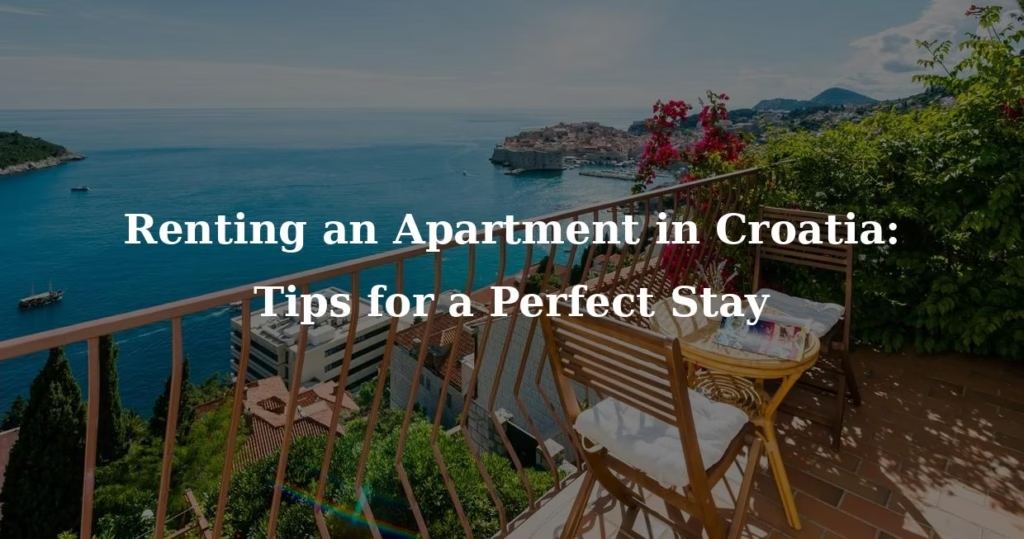Renting an apartment in Croatia offers travelers flexibility, comfort, and a chance to immerse themselves in local culture. Imagine waking up to the sound of waves in a seaside villa or enjoying a quiet morning coffee on the balcony of a quaint village apartment—the possibilities are endless. Whether you choose to book through online platforms or directly from private landlords, understanding the nuances of each option is crucial.

Table of Contents
ToggleUnderstanding the Croatian Rental Market
Croatia’s popularity as a tourist destination has led to a diverse range of accommodation options. From historic boutique hotels and seaside resorts with stunning Adriatic views to private apartments in quaint villages, luxurious villas with infinity pools, and family-friendly campsites, Croatia offers accommodation options that cater to every style, taste, and budget.
Private apartments, known locally as “apartmani,” are particularly popular among tourists seeking a more authentic experience. These accommodations range from budget-friendly studios to luxurious seaside villas.
Renting Through Online Platforms
Online platforms like Booking.com and Agoda.com have simplified the process of finding and booking accommodations.
Advantages:
Convenience: These platforms offer user-friendly interfaces, allowing you to filter options based on location, price, amenities, and guest reviews.
Security: Most platforms provide secure payment methods and customer support, such as 24/7 helplines, dispute resolution services, and assistance with cancellations or refunds, offering peace of mind during your booking process. For example, Booking.com provides local offices in Croatia where you can seek assistance with complaints:
- Zagreb: +385 1 643 9292
- Dubrovnik: +385 20 642 525
- Split: +385 21 672 424
These local offices ensure you have access to support during your stay in Croatia.
Transparency: Guest reviews and ratings help assess the quality and reliability of the accommodation.
Disadvantages:
Service Fees: Booking through these platforms often includes additional service fees, increasing the overall cost.
Limited Negotiation: Prices and terms are usually fixed, leaving little room for negotiation.
Potential for Misleading Listings: While rare, some listings may not accurately represent the property, leading to discrepancies upon arrival.
Renting Directly from Private Landlords
Opting for a private rental involves dealing directly with property owners, bypassing intermediaries.
Advantages:
Cost Savings: Without platform fees, rentals can be more affordable.
Personalized Experience: Direct communication with landlords can lead to customized arrangements and local insights.
Flexibility: There’s often more room to negotiate prices, check-in/check-out times, and other terms.
Disadvantages:
Lack of Formal Agreements: Without a formal contract, there’s a risk of misunderstandings or disputes.
Limited Recourse: In case of issues, resolving disputes may be more challenging without a mediating platform.
Payment Security: Direct payments may lack the security measures provided by online platforms.
Legal Considerations
Understanding the legal aspects of renting in Croatia is essential to ensure a hassle-free experience.
Registration: Landlords are required to register foreign guests with the local authorities within 24 hours of arrival. This ensures that your stay is legally documented and helps authorities manage tourism data effectively. It also provides additional safety measures for travelers, as their presence is officially recognized.
Tourist Tax: A daily tourist tax is applicable, varying by location and accommodation type.
Contracts: For longer stays, ensure a written contract outlining the terms of your stay to protect both parties.
Tips for a Successful Rental Experience
Research Thoroughly: Utilize multiple sources, including online platforms, local agencies, and personal networks, to find suitable accommodations.
Verify Legitimacy: Ensure the property is legally registered for tourist rentals to avoid potential issues.
Read Reviews: Previous guest experiences can provide valuable insights into the property’s condition and the host’s reliability.
Clarify Costs: Confirm all expenses, including utilities, cleaning fees, and tourist taxes, to avoid unexpected charges.
Communicate Clearly: Establish open communication with your host to address any questions or concerns promptly.
Inspect the Property: Upon arrival, check the accommodation to ensure it matches the description and meets your expectations.
Secure Valuables: Inquire about the property’s security features and take necessary precautions to safeguard your belongings.
Frequently Asked Questions (FAQs)
1. Is it better to book through a platform or directly with a landlord?
Both options have their pros and cons. Platforms offer convenience and security, while direct bookings can be more cost-effective and personalized. Consider your priorities and preferences when making a decision.
2. Are private rentals safe in Croatia?
Yes, private rentals are generally safe. However, it’s essential to verify the legitimacy of the property and read reviews from previous guests.
3. Do I need to pay a deposit for private rentals?
Many landlords require a security deposit, especially for longer stays. Ensure you understand the terms regarding deposits before confirming your booking.
4. How can I avoid scams when booking a rental?
To avoid scams, use reputable platforms, verify the property’s registration, communicate directly with the host, and be cautious of deals that seem too good to be true.
5. What should I do if I encounter issues during my stay?
Immediately communicate any problems to your host. If booked through a platform, utilize their customer support services for assistance.
Conclusion
Renting an apartment in Croatia can enhance your travel experience, offering a home-like environment and the opportunity to live like a local. Explore regions such as Dalmatia for coastal charm, Istria for its wine and gastronomy, or Zagreb for a vibrant city experience to make the most of your stay. By understanding the differences between booking through platforms and private landlords, and by following the tips provided, you can make an informed decision that best suits your needs. Always conduct thorough research, communicate clearly with your host, and ensure all legal requirements are met to enjoy a pleasant and memorable stay in Croatia.
Disclosure: This page may contain affiliate links. This means that we get a small commission from any purchase you make, at no additional cost to you!

